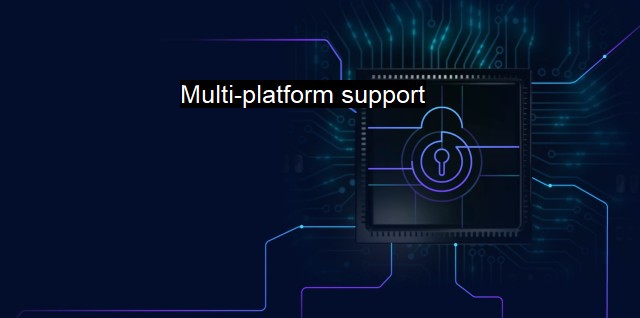What is Multi-platform support?
The Importance of Multi-Platform Antivirus Support in Today's Cybersecurity Landscape: A Comprehensive Guide
Multi-platform support refers to the ability of a solution or strategy to work effectively and uniformly across various types of systems, commonly known as 'platforms.'Platforms refer to the operating systems running on a device such as Windows, macOS, iOS, Android, and Linux. An array of distinct platforms exists, each with its unique set of advantages and challenges for security providers aiming to curb increasingly sophisticated cyber threats. Hence, cyber threats affecting these platforms can differ significantly, and not all security measures will be effective for each platform.
Thus, security software, more specifically, antivirus software, with multi-platform support not only means compatibility but also effective threat detection and mitigation capability across platforms. With the meteoric proliferation of connected devices, multi-platform support is vital for providing comprehensive security coverage.
Many individuals and businesses use an assortment of devices featuring different operating systems daily. As such, the risk of exposure to cyber threats increases. Multi-platform support is essential to provide holistic protection against a wide tabula of threats ranging from viruses, spyware, ransomware, Trojan horses, phishing attacks, to zero-day exploits.
Antivirus software with multi-platform support assures users that their devices are protected, regardless of the type or number of operating systems they are using. For enterprises running an array of operating systems and platforms, finding such comprehensive security solutions becomes increasingly imperative. From a practical perspective, using an antivirus solution that supports multiple platforms simplifies the process of managing security across all hardware assets.
One key advantage of multi-platform antivirus solutions is that it eliminates the need to find, install, and maintain separate antivirus software for each platform in use. This unified approach significantly reduces the effort and time dedicated to these tasks, leading to more efficient use of resources. Apart from these tangible advantages, an intangible benefit is that users can have peace of mind, knowing that all their devices are protected under one umbrella.
From a technical perspective, multi-platform support has its unique challenges. Different platforms have specific sets of vulnerabilities and require unique strategies for secure coverage. For instance, Android is an open-source platform, leaving it more vulnerable to attacks compared to tightly controlled platforms like iOS. Maintaining a single solution that effectively offers security against threats specific to each platform might be technically daunting but plays a pivotal role in comprehensive protection.
As cyber threats continue to evolve, multi-platform antivirus solutions must also continue to adapt and improve. Antivirus developers continuously monitor and respond to threats as they emerge, developing countermeasures as needed. This continuous evolution is necessary to cater to an increasingly diverse digital world with numerous platforms.
The concept of multi-platform support extends beyond just antivirus software. It is also applicable to other areas such as VPNs (Virtual Private Networks), firewalls, spam filters, and other cybersecurity tools. Regardless of the specific tool, the goal remains the same - to offer efficient, consistent, and effective protection against cyber threats across all user platforms.
Providing multi-platform support requires cybersecurity companies to constantly keep up-to-date with the latest versions of various operating systems, to ensure seamless and effective operations of their software solutions. Companies that can maintain this constant source of support will always stay ahead of cyber threats and provide customers with peace of mind.
While the cyber threat landscape continues to evolve with increased complexity and frequency across different platforms, multi-platform support in antivirus programs aids to be a vital necessity. As we increasingly live in a multi-device world, going for antivirus software with multi-platform compatibility assures protection and uniformity across various platforms, fostering a safe digital experience.

Multi-platform support FAQs
What does "multi-platform support" mean in the context of cybersecurity and antivirus?
Multi-platform support means that the antivirus software is capable of operating on different operating systems, including Windows, macOS, and Linux.Why is multi-platform support important for antivirus software?
Multi-platform support is important because it allows the antivirus software to protect a wider range of devices, such as laptops, desktops, and mobile devices. This provides comprehensive protection for all devices used in the organization.How do I know if an antivirus software offers multi-platform support?
You should check the product specifications or consult with the vendor to see if they offer multi-platform support. Many antivirus products will clearly state which operating systems they support, so be sure to review this information before making a purchase.Are there any drawbacks to using an antivirus software that offers multi-platform support?
There are no major drawbacks to using an antivirus software that offers multi-platform support. However, it is important to note that some features may not be available across all platforms. Additionally, the performance of the software may vary between different operating systems.| | A | | | B | | | C | | | D | | | E | | | F | | | G | | | H | | | I | | | J | | | K | | | L | | | M | |
| | N | | | O | | | P | | | Q | | | R | | | S | | | T | | | U | | | V | | | W | | | X | | | Y | | | Z | |
| | 1 | | | 2 | | | 3 | | | 4 | | | 7 | | | 8 | | |||||||